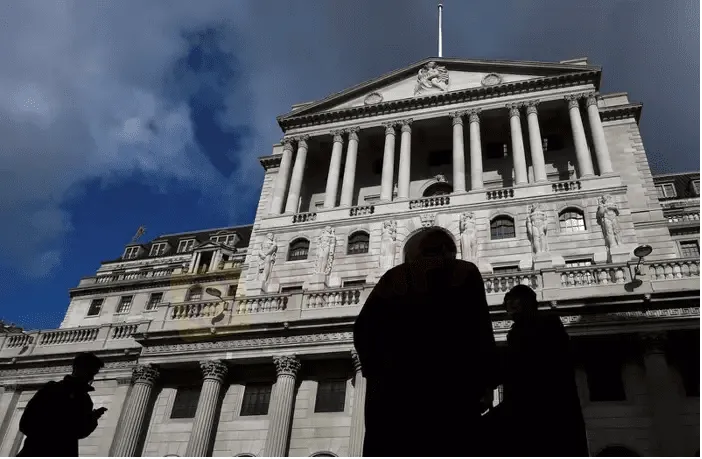简体中文
繁體中文
English
Pусский
日本語
ภาษาไทย
Tiếng Việt
Bahasa Indonesia
Español
हिन्दी
Filippiiniläinen
Français
Deutsch
Português
Türkçe
한국어
العربية
UK two-year gilt yields hit post-2008 high as inflation fears mount
Abstract:British short-dated government bond yields surged on Wednesday, hitting fresh 14-year highs as investors worried about surging energy prices and the knock-on effect for inflation and Bank of England interest rates.

Two-year gilt yields leapt as much as 24 basis points on the day to 2.959%, their highest since November 2008 when Britain was in the midst of the global financial crisis. At 1550 GMT they were trading at 2.94%.
Two-year yields, which are sensitive to the BoE rate outlook, have risen more than 50 basis points since data last week showed British consumer price inflation had hit double digits sooner than expected.
Gilts have also underperformed against U.S. and German debt, as investors judge the BoE will raise rates faster than the Federal Reserve and the European Central Bank.
The yield premium two-year gilts offer over German two-year bonds rose 15 basis points on Wednesday to just over 200 basis points, its widest since August 2005.
Investors were pricing the BoEs benchmark Bank Rate peaking at 4.5% in May 2023, more than double the current 1.75%, according to rate futures.
Imogen Bachra, fixed income strategist at NatWest Markets, said Wednesdays sell-off reflected ongoing concerns about inflation – and the likelihood of more government spending to offset soaring energy bills – rather than any new triggers.
Since the BoE raised rates by half a percentage point this month, its biggest hike since 1995, policymakers appeared more focused on keeping inflation expectations in check than staving off recession, she added.
“To the extent that significantly higher gas prices drive up inflation expectations, they drive up Bank Rate expectations as well,” she said.
Britains energy regulator is due to set out new maximum tariffs on Friday that are likely to cause household bills to almost double from October, and rise further in 2023.
Whoever succeeds Boris Johnson as prime minister is likely to have to announce emergency public spending measures to offset some of the rise, leading to greater debt issuance, Bachra said.
Longer-dated gilt yields were also up sharply. Five-year yields rose 20 basis points, 10-years by 12 basis points and 30-years by 5 basis points, pushing 5- and 30-year yields to their highest levels since 2011 and 2014 respectively.

Disclaimer:
The views in this article only represent the author's personal views, and do not constitute investment advice on this platform. This platform does not guarantee the accuracy, completeness and timeliness of the information in the article, and will not be liable for any loss caused by the use of or reliance on the information in the article.
Read more

The Daily Habits of a Profitable Trader
Every professional trader follows a structured approach to ensure they are well-prepared, disciplined, and able to seize opportunities with confidence. Whether you are a seasoned investor or an aspiring trader, adhering to a robust daily checklist can significantly enhance your performance. Use this checklist to check if you are a qualified trader

The Impact of Interest Rate Decisions on the Forex Market
Interest rate changes determine currency attractiveness, influencing capital flows and exchange rate trends. Understanding this mechanism helps investors navigate the forex market effectively.

How a Housewife Lost RM288,235 in a Facebook Investment Scam
A 47-year-old housewife in Malaysia recently fell victim to an online investment scam, losing a substantial sum of RM288,235 after engaging with a fraudulent scheme advertised on Facebook.

A Trader’s Worst Mistake: Overlooking Broker Reviews Could Cost You Everything
In today’s digital age, reviews influence nearly every decision we make. When purchasing a smartphone, television, or home appliance, we pore over customer feedback and expert opinions to ensure we’re making the right choice. So why is it that, when it comes to choosing an online broker where real money and financial security are at stake many traders neglect the crucial step of reading reviews?
WikiFX Broker
Latest News
The Withdrawal Trap: How Scam Brokers Lure Victims into Paying More
FCA to Investors: Think Twice Before Trusting These Brokers
Trump\s tariffs: How could they affect the UK and your money
Trump gambles it all on global tariffs he\s wanted for decades
TradingView Brings Live Market Charts to Telegram Users with New Mini App
Trump tariffs: How will India navigate a world on the brink of a trade war?
Interactive Brokers Launches Forecast Contracts in Canada for Market Predictions
Authorities Alert: MAS Impersonation Scam Hits Singapore
IG Group Acquires Freetrade for £160M to Expand UK Investment Market
U.S. March ISM Manufacturing PMI Released
Currency Calculator







